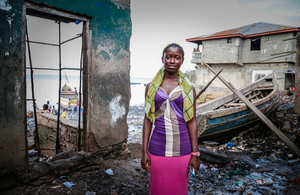The end of Ebola in Sierra Leone
How the UK has helped to end Ebola in Sierra Leone and continues to help the country rebuild.

Celina Kamanda stands near the water's edge in Magazine Wharf - one of Freetown's largest slums, where families were hit hard by the Ebola outbreak. Picture: Simon Davis/DFID
Sierra Leone was declared Ebola free on Saturday 7 November.
Infographics:
Ebola in Sierra Leone - UK aid response timeline
Free-to-use photographs are available via the following links:
Download hi-res, fully captioned versions in a zip file
All images should be credited to: Simon Davis/Department for International Development.
How the UK helped to end Ebola in Sierra Leone
The UK led the international response to the Ebola crisis in Sierra Leone and has committed £427 million so far to ending the epidemic.
The UK is the largest bilateral donor to Sierra Leone and our swift action in response to this unprecedented Ebola epidemic has had a significant impact.
Our objective is to support the Government of Sierra Leone to end the current outbreak, and to maintain the vigilance and preparedness necessary to prevent any future outbreaks from growing into epidemics – maintaining a ‘resilient zero’.
Over 1,500 British military personnel deployed to Sierra Leone to help oversee the construction of six UK funded treatment centres from scratch and trained over 4,000 Sierra Leonean and international health care workers.
The UK deployed over 150 NHS volunteers who worked on the frontline to support over 1,500 treatment and isolation beds – more than half of all the beds available for Ebola patients in the country.
The UK set up a 36-bed mobile field hospital, which can be up and running anywhere in the country within 96 hours to treat an outbreak of Ebola, or other infectious diseases.
Over 100 Public Health England staff ran three new laboratories, testing over a third of all samples across the country, greatly speeding up the diagnosis of people with Ebola-like symptoms.
The UK delivered 2,800 tonnes of aid for the response - more than one million PPE suits and 200 vehicles, including ambulances, were supplied to Sierra Leone.
The UK also supported more than 140 burial teams to provide safe and dignified burials. Burying bodies is one of the most common ways the disease can be spread.
A Royal Navy support ship (RFA Argus) and three Merlin helicopters provided transport and logistic support for medical teams and aid experts working in the country.
A report from the London School of Hygiene and Tropical Medicine estimated that 56,600 Ebola cases were averted in Sierra Leone as a direct result of additional treatment beds.
The first £5 million of public donations to the Disasters Emergency Committee appeal on the Ebola outbreak were matched by the UK.
Ongoing UK support to Sierra Leone
Post-Ebola, it is essential that we ensure the Sierra Leone has the capabilities, systems, and structures in place to respond to a future outbreak of Ebola or other public health emergency.
Ebola vaccines
DFID co-funded early clinical trials of some of the possible vaccines, working with partners including the Wellcome Trust, Oxford University and the Medical Research Council, and is working closely with the US Center for Disease Control and Prevention to support trials in West Africa amongst at-risk groups.
Survivors
The UK is supporting the Government of Sierra Leone in their work with survivors to reduce the potential risk of Ebola transmission. This includes:
- providing medical advice and counselling to help survivors cope with ongoing health problems
- providing guidance on avoiding sexual transmission and semen testing services to survivors
- exploring options for extending a trial Ebola vaccine to survivors’ partners and relatives
We will also support a longer term package of assistance for Ebola survivors, helping them to restore their livelihoods, ensuring they have access to healthcare and tackling the stigma they may face when reintegrating into their communities.
Helping the country recover
In parallel with the ongoing response, we are supporting Sierra Leone’s early recovery and transition from the Ebola crisis.
- UK support for early recovery in health is addressing the urgent needs of the health system for immunisation, essential drugs, improving protection control, water, sanitation and hygiene and district capacity-building.
- UK support for early recovery in education has allowed schools to reopen safely and catch up on lost time, and includes specific assistance for pregnant adolescent girls and disabled children.
- UK support for early recovery in social protection is providing support to those worst affected by the Ebola outbreak.
- UK support for early recovery in the private sector is helping promising medium-sized businesses in Sierra Leone escape the country’s current economic slump, restart growth and create jobs. Up to $50 million of short-term loans or overdrafts have been made available through Standard Chartered Bank and CDC – the UK’s Development Finance Institution – to businesses that are struggling to get the finance they need to grow. We are also providing $50m for debt relief through the IMF.
Updates to this page
-
Slight change to copy
-
Added credit to photo
-
First published.